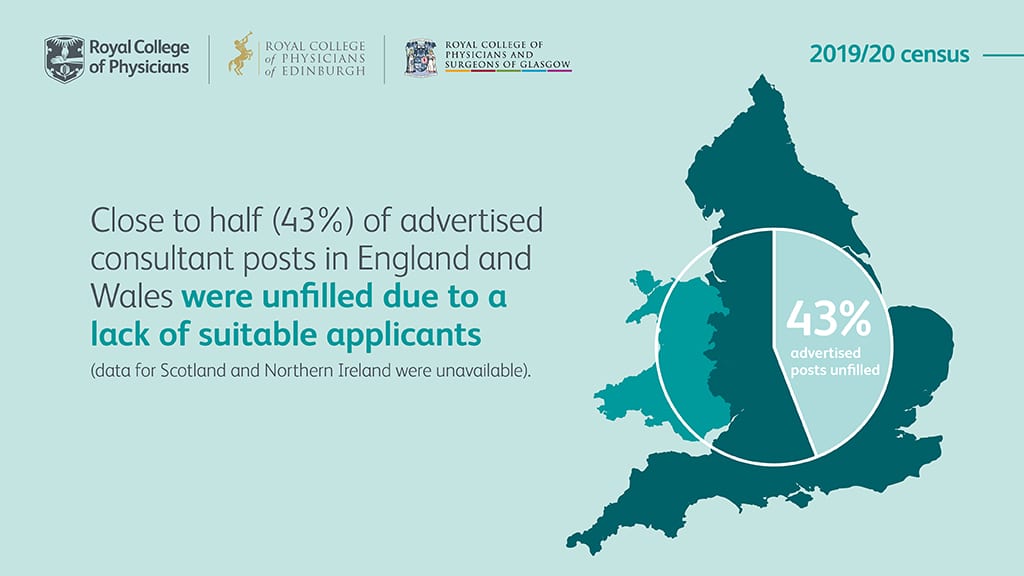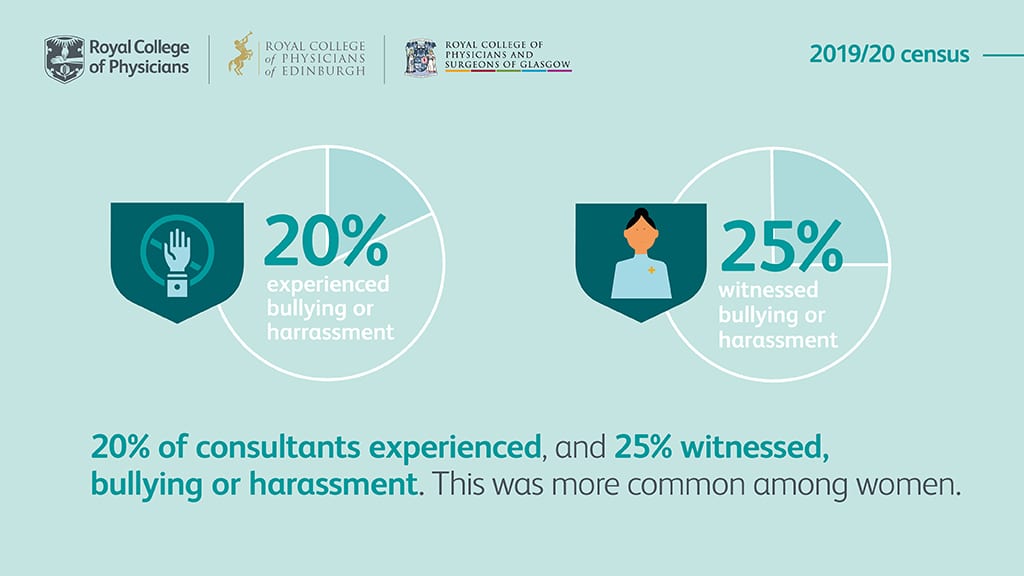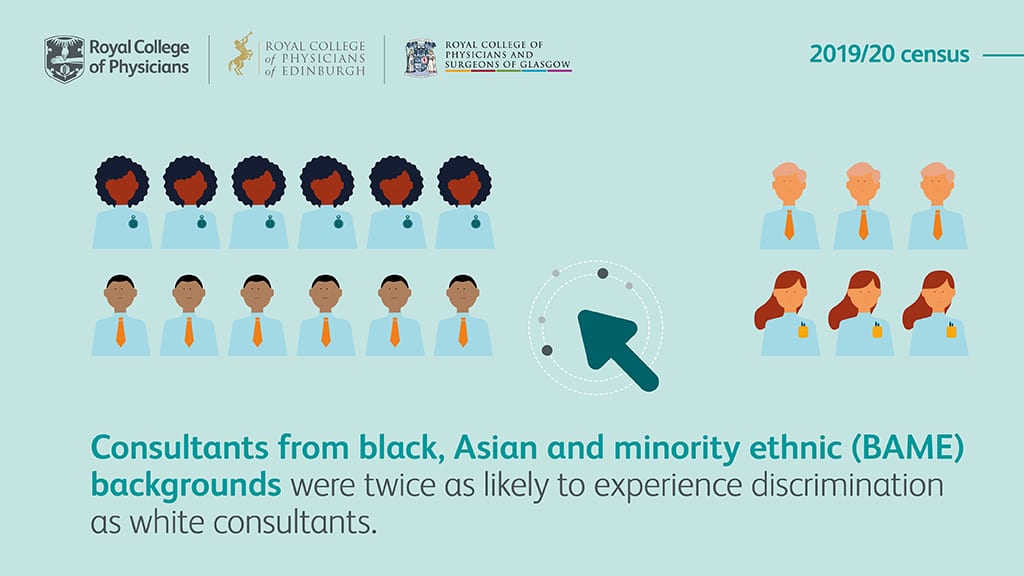The medical workforce before COVID-19: results of the 2019 UK physician census
05 Nov 2020
2020 has been dominated by the profound effects on the NHS of the COVID-19 pandemic. As the NHS moves from crisis management to recovery, longer term issues need to be addressed. The 2019 census reveals the continuing pressures on the medical workforce and the systems in which we work prior to the pandemic. The number of consultant posts needed continues to significantly outnumber supply.

Each year our college works in partnership with the Royal College of Physicians of London and the Royal College of Physicians of Edinburgh to produce the Annual Physicians’ Census.
The findings of 2019’s census have now been complied. This analysis, which was carried out by the RCPL’s Medical Workforce Unit on behalf of the three colleges, sets out the key findings.
Our college is grateful for the professionalism and support of the Medical Workforce Unit in compling the census and this analysis.
Key findings
2020 has been dominated by the profound effects on the NHS of the COVID-19 pandemic. As the NHS moves from crisis management to recovery, longer term issues need to be addressed. The 2019 physician census reveals the continuing pressures on the medical workforce and the systems in which we work prior to the pandemic. The number of consultant posts needed continues to significantly outnumber supply.
- Close to half (43%) of advertised consultant posts were unfilled due to a lack of suitable applicants.
- The ratio of consultant physicians to population served varies widely. Regions with fewer consultants have the highest rates of unfilled advertised posts and locum consultants.
- Consultants find their general internal medicine (GIM) work much less satisfying than specialty work.
- Unselected medical take/receiving was undertaken by only 30% of consultants and care of GIM inpatients by 42% of consultants.
- 20% of consultants experienced and 25% witnessed bullying or harassment. This was more common among female consultants.
- Consultants of black, Asian and minority ethnic origin (BAME) were twice as likely to experience discrimination as white consultants. Female consultants were twice as likely to experience discrimination as male consultants.
- Consultants estimate they work 10% more than they are contracted to do, mainly due to their clinical workload.
- Consultants who have retired and returned now constitute 15% of the workforce.
The pressure physicians are under appears to be the main factor behind the negative experiences documented by the 4,668 consultants who contributed to the census. Filling vacant consultant posts, reducing experiences of bullying, harassment and discrimination, addressing excessive workloads and improving consultant experiences of GIM are crucial if we are to improve the working lives of physicians in the UK so that they can care for the population we serve.
Next steps
Our colleges will continue to:
- Use the census data in our discussions with governments across the UK about the long-term pressures on the NHS and their impact on staff wellbeing.
- Work with the NHS in England to help develop the People Plan that supports its Long Term Plan, making the case for greater flexibility for staff of all ages and career stages.
- Call for medical school places to be doubled to 15,000 per year, publishing a report on the feasibility of such an expansion and how it could help regions with lower numbers of doctors.
- Identify and promote ways of encouraging trainees to work in specialties and locations with the largest recruitment gaps.
- Make the case for the UK to be accessible and welcoming to trainees and doctors from countries outside the UK.
Consultant workforce
The Medical Workforce Unit (MWU) of the RCP conducts an annual census on behalf of RCP London, the Royal College of Physicians of Edinburgh (RCPE) and the Royal College of Physicians and Surgeons of Glasgow (RCPSG).

The census was sent to 16,053 consultants and 4,668 (29%) responded. Removing consultants no longer working in the UK and adding new consultant appointments gave a total of 16,746 substantive consultant physicians in the UK.
Consultant physicians are not distributed evenly according to the background population. The ratio of full-time equivalent (FTE) substantive consultant to background UK population was 4,345. The highest ratios of FTE consultant to population were in: East Midlands (5,771); North Wales (5,683); East of England (5,332); Kent, Surrey and Sussex (5,311); and the South West (5,022). By far the best ratios in England were in London, eg London South (2,608). Regions with high FTE consultant to population ratios were among those with the highest rates of unsuccessful consultant appointments and the highest proportion of costly locum consultants. An important element of future workforce planning should include interventions to address these disparities.
There was a further increase in the number of female consultants, so that the consultant workforce is now 62% men and 38% women. The number of consultants working less than full time (LTFT) was the same as last year at 23%. 42% of women and 11% of men reported working LTFT. LTFT working is common at all ages among women but only starts to become common in men after 55. Despite the large number of consultants working LTFT, only 3.1% were in a job share.
68% of consultants described themselves as of white ethnic origin. The next largest ethnic group was Asian or Asian British (23%). Other ethnic groups were much smaller, with the largest being black or black British (2%). 76% of consultants graduated in the UK, 6% in Europe and 18% outside of Europe.
6% of consultants reported that they considered they had a long-term health condition or were disabled. 48% of those affected said that it impacted their work.
Consultant appointments
As in previous years of the census, very large numbers of advertised consultant posts with an advisory appointments committee in England and Wales were not filled (43%), usually due to a lack of applicants (57%) or suitable applicants (29%). In 2018, we noted a startling 33% reduction in advertised posts. In 2019, there was a modest 5% rise on 2018 in advertised posts, but levels remained low.

In England, the regions with the highest proportion of unsuccessful appointments were Northern (75%), followed by Thames Valley (62%), Kent, Surrey and Sussex (60%), North West (55%) and West Midlands (52%). It was easier to appoint in London – only 29% of appointments were unsuccessful.
Given trainees’ prioritisation of geographical location, illustrated by the fact that only 21% of CCT holders reported applying for a consultant post outside their deanery (add ref to class of 2018 report please), it is crucial that the geographical distribution of trainees in the UK better matches the geographical and population demand for consultant physicians.
Consultants reported that the following were most commonly affected by consultant vacancies in their department: 77% adequate work–life balance, 42% audit/QI, 39% elective work, 36% management work, and 34% CPD.
Locum consultants
The mean number of substantive consultants in a specialty department was 9.5 and the mean number of locum consultants was 0.8. The specialties with the highest ratio of locum to substantive consultants were stroke medicine, acute medicine, geriatrics, and dermatology. 17% of departments were 10–20% locums; 10% were 20–30% locums; and 4% were 30–40% locums.
UK regions with the highest ratio of FTE consultant per population also had the highest ratios of locum to substantive consultants in a department – East of England 13%, Kent Surrey and Sussex 11.9%, North Wales 11%.
Consultant job satisfaction
Consultants most commonly reported always (27%) or often (59%) finding their specialty work satisfying. However, consultant physicians again reported finding their GIM work less satisfying, with only 36% often and 35% sometimes finding GIM work satisfying.
There were marked variations between the large specialties who undertake GIM work, in the proportion of consultants reporting that they never or rarely find GIM work satisfying:
- 40% of cardiologists
- 35% of gastroenterologist/hepatologists
- 20% of respiratory physicians
- 16% of endocrinology/diabetes consultants
- 12% of geriatricians
Teams
Effective and supportive teams are crucial to physicians’ wellbeing. Most consultants (82%) responding clinically supervise trainees. 75% have face-to-face meetings to discuss patients trainees have reviewed in outpatients. 47% have tea or coffee breaks with their trainees, 27% lunch with their trainees and 44% reported socialising with their trainees.
41% of consultants reported that they usually did not get a break for lunch and 32% that this lasted only 0–15 minutes – a further sign of excessive workloads.
Bullying, harassment and discrimination
Following reports of bullying and harassment affecting trainees, we asked consultants about their experiences.

20% of consultants reported feeling bullied or harassed in the past year and 25% witnessed a colleague being bullied or harassed – usually other consultants (64%), nursing staff (32%) and specialist registrars (20%). When consultants felt bullied or harassed, those responsible were managers (58%), other consultants (54%), patients (12%) and relatives (14%). Those responsible for witnessed bullying or harassment were also usually managers (50%) or other consultants (57%) and less commonly nursing staff (14%), patients (9%) and relatives (10%).
We also asked about consultants’ experiences of discrimination. 11% of consultants reported experiencing discrimination over the past year and 10% witnessing a colleague experiencing discrimination. The most common types of discrimination experienced and witnessed were race (50%), gender (45%) and age (14%). When consultants felt discriminated against, those responsible were other consultants (42%), patients (40%), managers (25%) and relatives (12%). Those felt responsible for witnessed discrimination were patients (52%), other consultants (32%), relatives (25%) and managers (18%).
Ethnicity

BAME consultants reported experiencing bullying and harassment as often as white consultants, but were twice as likely to experience discrimination (17% versus 8%) and 50% more likely to witness discrimination. Overwhelmingly, when BAME consultants experienced discrimination, this was on the basis of race (76%) and to a lesser extent gender (23%), with those responsible being patients (45%), other consultants (35%) and managers (33%).
Gender
Female consultants reported both experiencing (25%) and witnessing (29%) bullying and harassment more commonly than male consultants (17% and 21% respectively). Female consultants were also more likely to experience (15%) or witness (12%) discrimination than male consultants (8% and 8% respectively). When female consultants experienced discrimination, this was on the basis of gender (59%) and to a lesser extent race (27%), and those responsible were other consultants (48%) and patients (39%) predominantly. When female consultants reported witnessing discrimination, this was on the basis of both race (74%) and gender (38%), with those responsible being patients (55%), other consultants (31%) and relatives (26%).
General internal medicine
The unselected medical take was undertaken by only 30% of consultant physicians. GIM duties including care of GIM inpatients were undertaken by 42% of consultant physicians.
We estimated the total contribution to GIM duties (including the acute medical take) by medical specialty and this came principally from five large specialties:
- 18% geriatric medicine
- 16% respiratory medicine
- 14% gastroenterology/hepatology
- 12% endocrinology/diabetes
- 12% acute internal medicine.
Job planning
A current, agreed job plan is a key contribution to consultant productivity and job satisfaction. 92% of consultants reported having a current job plan and 84% that this had been reviewed and agreed within the last year, as recommended.
It is good practice to undertake job planning in teams but this remains relatively uncommon, with no change since last year. There were significant national variations: 31% in England, 27% in Wales, 19% in Scotland and 8% in Northern Ireland. Team job planning was more common in some specialties – in over 37% of acute physicians, stroke physicians and palliative medicine consultants.
More consultants reported having an annualised contract – 43% in England and 53% in Scotland, but only 24% in Wales and 20% in Northern Ireland.
Contracted and worked PAs
Contracted PAs
Consultant job plans are split into 4-hour work periods called programmed activities (PAs).
The mean number of contracted PAs per consultant was 10.4. On average, 7.3 PAs were spent in Direct Clinical Care (DCC) work, 1.9 in Supporting Professional Activities (SPA) work, 0.6 in academic work and 0.7 in ‘other’ work.
Worked PAs
The mean number of PAs consultants estimated they worked was 11.4. 7.8 were spent in DCC, 2.0 in SPAs, 0.8 in academic work and 0.9 in ‘other’ work. As with previous years of the census, consultants worked on average 10% more than they were contracted to do.
The most common reasons for working unpaid were consultants’ clinical workload (75%), additional responsibilities and external duties (50%), personal choice (37%) and covering for a colleague or vacancy (31%).
Retirement plans
24% of current consultants will reach 65 in the next 10 years, and 41% will reach 60. The mean age of planned retirement among consultants was 62.5 years. Therefore 35% of current consultants will reach their intended retirement age in the next decade.
Consultants who retired and returned to work comprised 15% of consultants completing the census – a significant increase from 5% last year. This is likely due to a combination of better ascertainment and the effects of the pension tax charge. Specialties varied in the proportion of consultants deciding to retire and return, from 7% in palliative medicine to 27% in clinical neurophysiology. In general, consultants in the smaller sub-specialities without a GIM commitment were more likely to retire and return.
Consultant who retried and turned reported undertaking the following work:
- outpatients 77%
- care of specialty inpatients 41%
- elective work 23%
- management 23%
- specialty on call 20%
- care of GIM patients 15%
- unselected medical take 13%
- academia, research, education or training 12%.
Categories: Wellbeing, Workforce
Latest news and statements
Key priority areas
Topics
- Workforce
- Wellbeing
- Equality, Diversity and Inclusion
- Climate Change
- Health Inequalities
- College
- Obesity
- COVID-19
Archive
Key links
Tweets by @rcpsglasgow